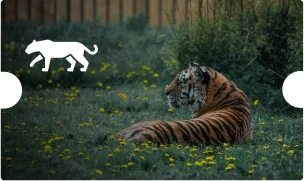

Located in the Terai region of Uttar Pradesh, Dudhwa National Park features a rich variety of flora. The park's landscape is dominated by moist deciduous forests, with Sal (Shorea robusta) forming the canopy. Other notable tree species include Asna (Terminalia alata), Shisham (Dalbergia sissoo), and Jamun (Syzygium cumini). Expansive grasslands and wetlands thrive, with tall Saccharum grasses flourishing in marshy areas. The understorey is densely packed with shrubs, herbs, and climbers, while seasonal flowers add vibrant colours throughout the year.
Dudhwa National Park is a haven for diverse wildlife, including endangered species like the Bengal tiger (Panthera tigris tigris) and Indian rhinoceros (Rhinoceros unicornis). Other prominent mammals include swamp deer (Rucervus duvaucelii), sambar deer (Rusa unicolor), and spotted deer (Axis axis). The park is also home to over 400 bird species, such as the great hornbill (Buceros bicornis) and Bengal florican (Houbaropsis bengalensis). Reptiles like the Indian python (Python molurus) and gharial (Gavialis gangeticus) add to the park's rich biodiversity, along with a variety of aquatic life.
The best time to visit is from November to April, when the weather is pleasant, and wildlife sightings are more frequent. The park is closed from June to October due to the monsoon season.
The nearest airport is Chaudhary Charan Singh International Airport in Lucknow (230 km away). The closest railway station is in Dudhwa, about 4 km from the park. The park is also accessible by road from major cities like Lucknow, Bareilly, and Delhi.
The park is renowned for its rich wildlife, including Bengal tigers, Indian rhinoceroses, swamp deer, and over 400 species of birds. The diverse flora, with dense forests, grasslands, and wetlands, also attracts many visitors.
Yes, there are several accommodation options within and around the park, including forest rest houses, lodges, and resorts that cater to different budget ranges.
Visitors can enjoy wildlife safaris, bird watching, nature walks, and photography. The park offers jeep safaris to explore its diverse ecosystems.
Yes, it is safe to visit the park, especially during the recommended visiting months. It is advised to follow the park rules, stay within designated areas, and be accompanied by a guide during safaris.
Yes, visitors need a permit to enter the park. It’s advisable to book in advance, especially during peak tourist season.
Yes, the park is family-friendly, and children can enjoy the safaris and nature walks. However, it’s essential to keep a close watch on children and follow safety guidelines.
Carry essentials such as binoculars, cameras, comfortable clothing, sturdy shoes, insect repellent, sunscreen, and water bottles. It is also advisable to carry any personal medications.
Yes, guided tours are available. Experienced guides can enhance your wildlife spotting experience and provide valuable information about the flora and fauna.
Daily jeep safaris operate in open 4WD vehicles from 7:00 AM to 10:00 AM and 1:00 PM to 5:00 PM.
Experience the thrill of a Jhalana Leopard Safari and witness the elusive leopards in their natural habitat!
Experience the thrill of a Jhalana Leopard Safari and witness the elusive leopards in their natural habitat!

Book Cabs
Starts From ₹3000
View Details →

Book Flights
Starts From ₹8200
View Details →

Book Hotels
Starts From ₹3500
View Details →

Book Safaris
Starts From ₹1250
View Details →

Welcome to World of Wilders, a travel management company that offers an unparalleled travel experience in India. We specialise in Jaipur Safaris, Indian Safaris, Rajasthan Tours, India Tours, Flight and Hotel Bookings and Cab Booking in Jaipur.
Designed & Developed with ♥ in India by TakeOff Ventures